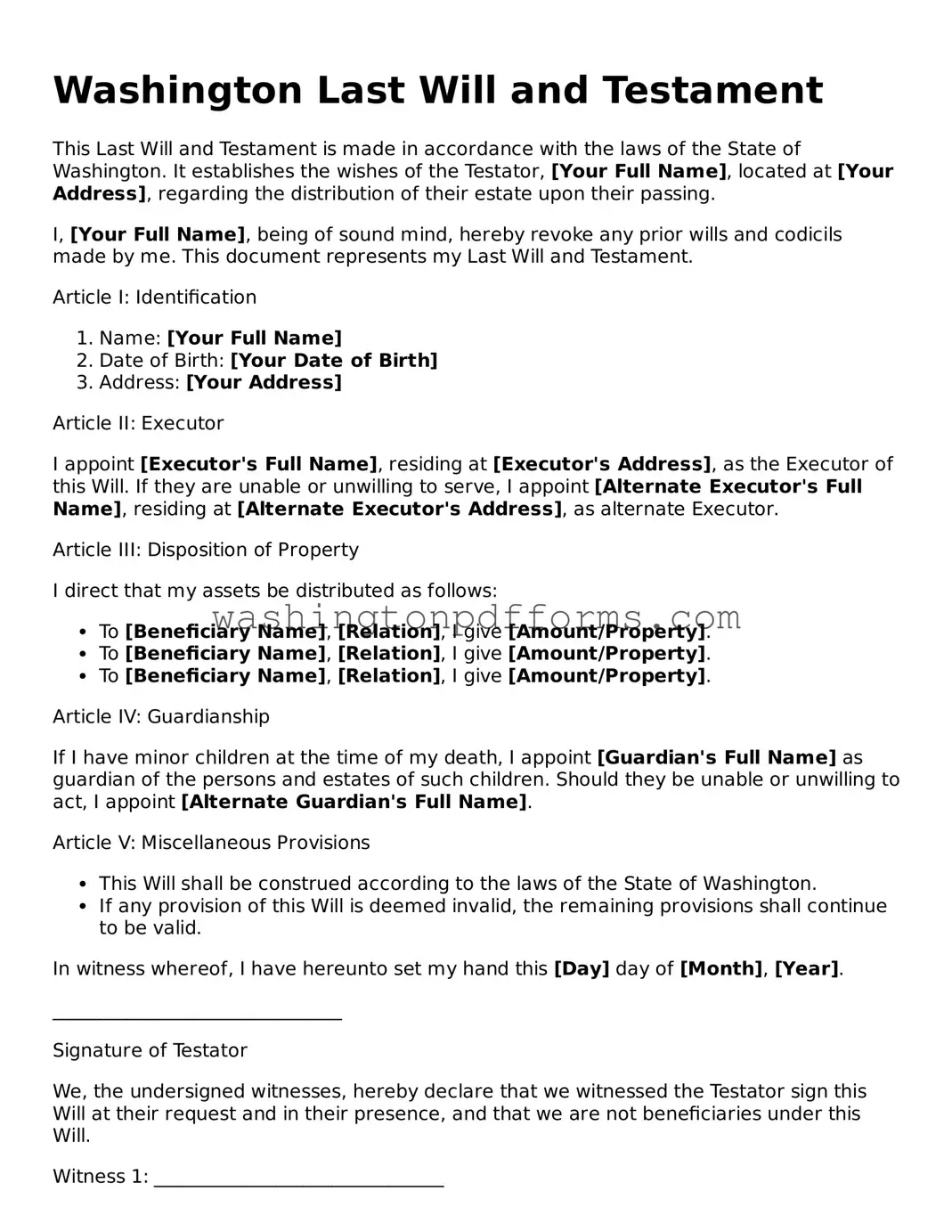Attorney-Approved Washington Last Will and Testament Template
In the state of Washington, the Last Will and Testament form serves as a crucial legal document that outlines an individual's wishes regarding the distribution of their assets after death. This form is not merely a piece of paper; it embodies the intentions and desires of a person, ensuring that their estate is handled according to their preferences. Key components of this document include the appointment of an executor, who is responsible for managing the estate and carrying out the terms of the will, as well as the designation of beneficiaries, who will receive the deceased's property. Additionally, the form allows for the inclusion of specific bequests, which can detail particular items or amounts of money to be given to certain individuals. It is essential for the will to be signed and witnessed properly to ensure its validity, reflecting the legal requirements of the state. By understanding these major aspects, individuals can better navigate the complexities of estate planning, ensuring that their legacy is honored and their loved ones are taken care of in the future.
Common mistakes
Filling out a Last Will and Testament in Washington can be a straightforward process, but mistakes often occur. One common error is failing to properly identify the testator. The testator is the person making the will. It is crucial to include full legal names and any relevant aliases to avoid confusion later.
Another frequent mistake involves the lack of witnesses. Washington law requires that a will be signed in the presence of at least two witnesses. If this step is overlooked, the will may be deemed invalid. Witnesses should not be beneficiaries in the will, as this can create complications.
Many individuals also neglect to clearly outline their wishes regarding the distribution of assets. Vague language can lead to disputes among heirs. Specificity is key; clearly state who receives what, and include alternate beneficiaries in case the primary ones are unable to inherit.
Some people forget to sign the will. A will must be signed by the testator to be valid. If the will is not signed, it may not hold up in court, leaving the estate to be distributed according to state laws rather than personal wishes.
Additionally, failing to update the will after major life changes can be a critical mistake. Events such as marriage, divorce, or the birth of a child can significantly alter one's wishes. Regularly reviewing and updating the will ensures it reflects current intentions.
Lastly, individuals may overlook the importance of including a self-proving affidavit. This document simplifies the probate process by allowing the will to be accepted without needing to contact witnesses. Including this can save time and reduce complications during the estate settlement.
Similar forms
- Living Will: A living will outlines a person's preferences for medical treatment in case they become unable to communicate their wishes. Like a Last Will and Testament, it addresses important decisions regarding one's future, but it focuses on healthcare rather than asset distribution.
- Power of Attorney: This document allows an individual to designate someone else to make decisions on their behalf, particularly in financial or legal matters. Both documents empower individuals to plan for future scenarios, although a power of attorney is often effective while the person is still alive.
- Trust: A trust manages a person's assets for the benefit of others. Similar to a Last Will, it facilitates the distribution of assets, but it can provide more control over how and when beneficiaries receive their inheritance.
- Advance Healthcare Directive: This document combines a living will and a medical power of attorney. It provides instructions for medical care and appoints someone to make healthcare decisions. Both documents ensure that a person's wishes are honored in medical situations.
- Letter of Instruction: A letter of instruction offers guidance to loved ones about personal matters, funeral arrangements, and asset distribution. While it does not have legal standing like a Last Will, it serves as a helpful supplement to clarify wishes.
- Codicil: A codicil is an amendment to an existing will. It allows for changes without creating an entirely new document. This is similar to a Last Will in that it deals with the distribution of assets and can clarify or alter previous intentions.
- Beneficiary Designation Forms: These forms specify who will receive certain assets, such as life insurance or retirement accounts. Like a Last Will, they direct how assets are distributed, but they operate outside of probate and can take effect immediately.
- Guardianship Designation: This document names a guardian for minor children in the event of a parent's death. Similar to a Last Will, it ensures that a person's wishes regarding their dependents are respected.
- Deed of Gift: A deed of gift transfers ownership of property or assets during a person's lifetime. While a Last Will distributes assets after death, both documents serve to convey ownership intentions.
- Estate Plan: An estate plan encompasses a variety of documents, including wills and trusts. It provides a comprehensive strategy for managing and distributing assets, similar to the objectives of a Last Will.
Some Other Washington Templates
Washington State Power of Attorney - This document can play a pivotal role in facilitating a child's routine during unexpected events.
Small Estate Affidavit Washington Pdf - The Small Estate Affidavit can be included in a probate package if needed.
